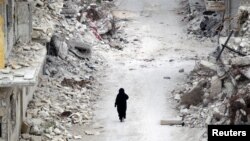The International Syria Support Group announced after its recent meeting that all parties, including Russia and Iran, have agreed to strengthen the Cessation of Hostilities, to ensure humanitarian access in Syria, and to move toward a political transition.
“The challenge we now face,” said U.S. Secretary of State John Kerry, “is to transform these possibilities into a reality of an agreement.”
The first step is to transform the cessation of hostilities into a comprehensive ceasefire. In a statement, the International Syria Support Group, or ISSG, called on all groups to stop the indiscriminate use of force. “We welcome Russia’s commitment to work with the Syrian authorities to halt aerial bombardments over areas predominantly inhabited by civilians or parties to the cessation,” said Secretary Kerry.
The ISSG statement also calls on all parties to the cessation of hostilities to disassociate themselves physically and politically from Daesh and al-Nusrah. To that end, the U.S. remains committed to helping prevent the flow of foreign fighters, weapons, and financial support to terrorist organizations.
The delivery of humanitarian assistance to Syria remains of supreme importance. Starting June 1, if the United Nations is denied humanitarian access to any of the areas in need, the ISSG calls on the World Food Program to carry out a campaign of air bridges and air drops. In addition, the World Food Program will accelerate air drops in Deir al-Zour, where it has already provided some 460 metric tons of food to more than 100,000 people. “Aid to these areas,” said Secretary Kerry, “must be a step towards a full, sustained, and unimpeded access throughout [Syria.]”
And finally, there must be substantive discussions on reaching a framework agreement for a political transition in Syria by August 1. Those talks should address the structure, membership, operational rules, and roles and responsibilities of a broad, non-sectarian, transitional governing body.
The fate of millions of Syrians hangs in the balance. That’s why it’s critical that all parties to the conflict immediately implement the steps agreed to by the International Syria Support Group.
















